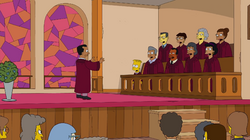
Difference between revisions of "Amazing Grace (Better Off Ned)"
Wikisimpsons - The Simpsons Wiki
Solar Dragon (talk | contribs) |
m (replaced: {{w| → {{W| (3)) |
||
| Line 7: | Line 7: | ||
|characters = [[Bart Simpson]]<br>Church choir | |characters = [[Bart Simpson]]<br>Church choir | ||
|length = 0:12 | |length = 0:12 | ||
| − | |writer = {{ | + | |writer = {{W|John Newton}} |
|album = | |album = | ||
|appearance = "[[Better Off Ned]]" | |appearance = "[[Better Off Ned]]" | ||
| Line 21: | Line 21: | ||
== Behind the Laughter == | == Behind the Laughter == | ||
| − | "{{ | + | "{{W|Amazing Grace}}" is a real [[Jesus Christ|Christian]] hymn published in 1779 with words written in 1772 written by {{W|John Newton}}. |
== Appearances == | == Appearances == | ||
Latest revision as of 16:50, October 15, 2021
- For others named Amazing Grace, see Amazing Grace.
"Amazing Grace"
| ||||||||||
Song Information
|
"Amazing Grace" is a song sung by Bart Simpson and the choir from the First Church of Springfield.
Lyrics[edit]
- Amazing grace! How sweet the sound
- That saved a wretch like me.
- I once was lost, but now am found,
- Was blind...
Behind the Laughter[edit]
"Amazing Grace" is a real Christian hymn published in 1779 with words written in 1772 written by John Newton.

